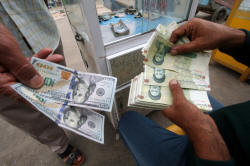Iran says it will resist 'economic war' as U.S. revives
curbs
 Send a link to a friend
Send a link to a friend
 [November 05, 2018]
By Lesley Wroughton and Parisa Hafezi [November 05, 2018]
By Lesley Wroughton and Parisa Hafezi
WASHINGTON/DUBAI (Reuters) - Iran said it
would defy U.S. sanctions reimposed on it by Washington on Monday,
denouncing as "economic war" the U.S. attempt to curb Tehran's missile
and nuclear programs and weaken its influence in the Middle East.
The U.S. move restores sanctions lifted under a 2015 nuclear deal
negotiated by the administration of President Barack Obama and five
other world powers. It adds 300 new designations in Iran's oil,
shipping, insurance and banking sectors.
European powers which continue to back the nuclear deal said they
opposed the reimposition of sanctions and major oil buyer China said it
regretted the move.
The restoration of sanctions is part of a wider effort by U.S. President
Donald Trump to force Iran to further limit its nuclear work and to halt
and missile program as well as its support for proxy forces in Yemen,
Syria, Lebanon and other parts of the Middle East.
Switzerland said it is holding talks with the United States and Iran
about launching a humanitarian payment channel to help food and drugs
keep flowing to Tehran.

U.S. sanctions permit trade in humanitarian goods such as food and
pharmaceuticals, but measures imposed on banks and trade restrictions
could make such items more expensive.
U.S. Secretary of State Mike Pompeo said on Sunday the penalties set to
return on Monday "are the toughest sanctions ever put in place on the
Islamic Republic of Iran".
However, Iran's clerical rulers have dismissed concerns about the impact
of sanctions on the economy.
"Today the enemy (the United States) is targeting our economy...the main
target of sanctions is our people," Iranian President Hassan Rouhani
said.
SANCTIONS "ILLEGAL AND UNFAIR"
"America wanted to cut to zero Iran's oil sales...but we will continue
to sell our oil...to break sanctions," Rouhani told economists.
The sanctions were illegal and unfair, he said.
"This is an economic war against Iran but... America should learn that
it cannot use the language of force against Iran ... We are prepared to
resist any pressure," Rouhani said.
Reiterating Iran's position that the Trump administration is not a
trustworthy partner for talks, Rouhani said: "Holding talks is not an
issue for us - only if the other party respects its commitments and
promises."
Trump announced in May his government was withdrawing from what he
called the "worst ever" agreement negotiated by the United States. The
other parties to the deal - Britain, France, Germany, China and Russia -
say they will not leave.
The deal had seen most international financial and economic sanctions on
Iran lifted in return for Tehran curbing its disputed nuclear activity
under U.N. surveillance.
Details of the sanctions will be released at a news conference scheduled
for 8:30 a.m. EST (1330 GMT) with Pompeo and Treasury Secretary Steven
Mnuchin.
[to top of second column] |

Iranian rials, U.S. dollars and Iraqi dinars are seen at a currency
exchange shop in Basra, Iraq November 3, 2018. Picture taken
November 3, 2018. REUTERS/Essam al-Sudani

The European Union, France, Germany and Britain said in a joint statement that
they regretted the U.S. decision and would seek to protect European companies
doing legitimate business with Tehran.
China, India, South Korea, Japan and Turkey - all top importers of Iranian oil -
are among eight countries expected to be given temporary exemptions from the
sanctions to ensure crude oil prices are not destabilized.
The countries will deposit Iran's revenue in an escrow account, U.S. officials
have said.
AIR DEFENSE DRILLS
News of the waivers helped lower oil prices early on Monday, since they allow
major buyers to import Iran's oil for a while. Brent crude was down 15 cents a
barrel at $72.68 by 1030 GMT. U.S. light crude CLc1 was 30 cents lower at
$62.84.
Rouhani said even without the waivers Iran would still be able to sell its oil,
semi-official Tasnim news agency reported.
The Iranian military launched two days of air defense drills on Monday across
northern Iran, and state TV aired footage of surface-to-air missiles and air
defense systems. Iran's elite Revolutionary Guards Corps are among the forces
participating.
The curbs come as the United States is focused on U.S. congressional and
gubernatorial elections on Tuesday. Campaigning in Chattanooga, Tennessee, on
Sunday, Trump said his "maximum pressure" against Iran was working.
"Iran is a much different country than it was when I took office," said Trump,
adding: "They wanted to take over the whole Middle East. Right now they just
want to survive."

To keep the deal alive, the remaining parties to the Iran accord are trying to
maintain trade with Tehran, despite scepticism that this is possible.
Diplomats told Reuters last month that a new EU mechanism to facilitate payments
for Iranian oil exports should be legally in place by Nov. 4 but not operational
until early next year.
They cautioned, however, that no country had volunteered to host the entity,
which was delaying the process.
(Editing by William Maclean and Angus MacSwan)
[© 2018 Thomson Reuters. All rights
reserved.] Copyright 2018 Reuters. All rights reserved. This material may not be published,
broadcast, rewritten or redistributed.
Thompson Reuters is solely responsible for this content. |